#and bombastic narration
Text
Tony Stark was more cold war centric than Bruce Wayne initially, but Tony Stark is a better guy than Bruce Wayne to me. And you know why? Tony Stark is someone I can actually really relate to or at least feel sympathy for. He closes himself off from people because of his heart problem. He's a man constantly on the verge of death, and he's afraid to let other people in. That's horribly sad, but it's also interesting and sympathetic.
Bruce Wayne meanwhile.... What's he got? Oh, his parents died. Sure, that's tragic. But besides that, the man has a very normal life (besides his vigilante activities). I find next to nothing relatable about him most of the time. To me, he's just a giant dull canvas. There's possibly potential there, but he's so boring I can't bring myself to even care about him. At least Superman is fun and cool and not so boring he makes me tune him out. Marvel doesn't have many characters like that, honestly. Stan Lee's writing style back in the 60s was too bombastic for me to really forget any of his main characters. Stan lee was a master of that. DC apparently has more struggles in that column.
#marvel#marvel comics#dc#dc comics#dcu#iron man#tony stark#anti batman#anti bruce wayne#and why not?#mcu#I don't watch many superhero movies#but tony stark is cooler no matter what#stan lee#stan lee was a master with dialogue#and bombastic narration
30 notes
·
View notes
Text
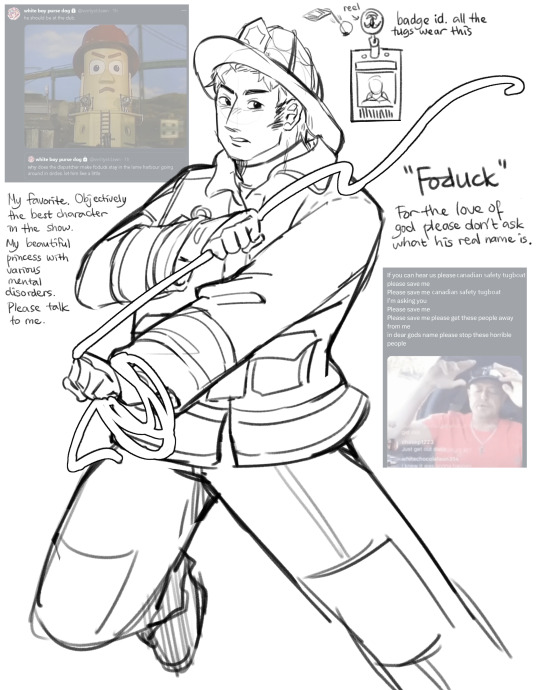
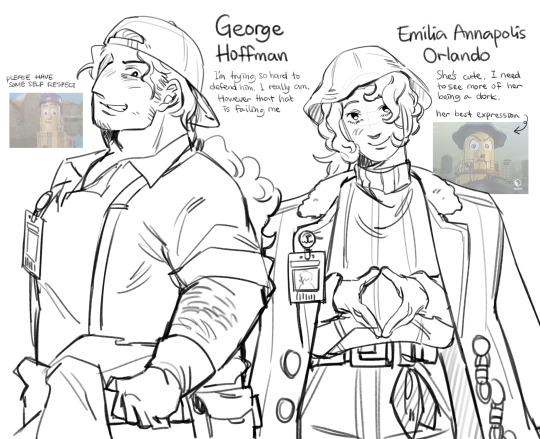
special thanks to these pez dispensers for accompanying me during my stay at the hospital. glory to canada
#theodore tugboat#theotug foduck#theotug george#theotug emily#stanza halifax#<--- don't expect this to be a big AU in this blog because TUGS is the main focus regarding boats. I just wanna draw gijinkas#senjart#sorry for not answering the asks guys. I got admitted into a hospital since tuesday and just got released yesterday (laugh track)#anyways about the show. theodore tugboat am I right#like I've said before it doesn't hit me as hard as thomas or TUGS#like it's not as character heavy as ttte#or as worldbuilding heavy as TUGS#but it's like.... a really fun relaxing show. super good even#I'd usually roll my eyes at overly nice protagonists but theodore is an exception. he is my friend. my pal#maybe it's just my affinity for shows with talking vehicles but erm.... robert cardonna you've done it again#the show doesn't have big explosions or bombastic events unfolding#the episodes have this very quiet and soft narration by danny doherty. no loud sounds or weird wacky silly sound effects in a bwba fashion#also everyone is nice to each other in this show which surprised me lol#because I've grown accustomed to the british-style verbal battles between sudrian engines#and the typical blink-and-you-miss-it dark comedy quips from top hat and zorran#theodore tugboat: what a peaceful day at halifax :) we talked about our problems properly and learned more about the world#TUGS: what a peaceful day at vaguely san francisco :) only 2 trampers died instead of the usual 5#I recommend it if you want a show that's easy to digest and easy on the eyes/brain#some episodes have characters that should've been switched to make it make sense#like harbour fools or even bumper buddies#I eventually got used to it#and there's not much worldbuilding going on. not my hugest complaint since it's still a cute show#there are also a few inconsistencies here and there... not to mention the episode order that kind of confused me#the side characters haven't grown much on me but I guess it just doesn't hit me YET#it's still good. I'll give it an 8/10
157 notes
·
View notes
Text
eclipsearising
This is why I think Kishimoto didn’t really think about his word building. He just went “You know what would be cool?” And then came up with something completely stupid/
Me: no no no you don’t understand THIS IS LITERALLY WHAT HE DID. THIS IS LITERALLY IT. I HAVE SEEN IT WAY TOO MANY TIMES FOR IT NOT TO BE. Examples off the top of my head being *especially* in the 4th war.
-There is- literally an entire *episode* of Naruto’s training with Killer B dedicated to Naruto learning he can’t make shadow clones in Kyuubi mode because that will *actually kill him* because of how the chakra drain works in that mode. It is literally hand waved the moment Naruto leaves the island because Kishi refuses to let *any* character other than Naruto be useful and so he needs to go to like five different places at once to fight zetsu in kyuubi mode. in universe it’s something about Kurama not trying to kill Naruto with chakra drain anymore but like- that isn’t explained until multiple episodes of Naruto casually using shadow clones and *not thinking about the consequences* and his *trainer Killer B* not stopping him or reminding him about the danger so clearly that excuse was thrown in last second to appease the plot hole.
-In the same episodes as the above, Naruto learns he can’t use RASENGAN in kyuubi mode because, in a potentially neat twist, it turns out the Rasengan works on the same principles as a biju bomb and when he tries to rasengan the kyuubi chakra converts it into a biju bomb instead. You can look at *almost any 4th war fight with naruto in it* and see him spamming rasengan. in kyuubi chakra cloak mode.
-Sasuke fighting Deidara pre 4th war. He’s literally out of chakra but somehow not only summons a boss summon, but forces it to shield him from a fatal blast. Because Cool Points™.
-The entire. fricken. 4th war. Is building up to Madara being the final boss. I am not joking. Like- I know I’m not a published author or whatever but I’ve been writing multi chapter fic for somewhere around 7-8 years and I’ve been reading gobs of stories since I had the brain power to process words. The narrative build up is there. The entire point to nerfing the 5 kage so they can’t beat Madara, to *all of the Biju* not being able to beat Madara and getting retaken into the jyuubi/making him the jyuubi jinchuuriki is one long, poorly executed difficulty spike for the final boss. There is an *entire scene* that goes for 5 plus minutes of Obito using what he thinks is his dying will to pull out a fragment of chakra from the Ichibi and Gyuuki respectively because that directly ties into the tug of war that happened however many eps back when Obito was the kyuubi Jinchuuriki. Naruto had received chakra from every biju except the Ichibi and Gyuuki and was able to use those as a connection to *pull the biju out* of the seal and free them/rescue them and thus de-power Obito, but he couldn’t do it with Ichibi and Gyuuki because he’d never gotten that piece of their chakra and couldn’t resonate with them/pull them free. And Obito, when he does his heel face turn and becomes good again, risks using what could literally be his last moments to get those two bits of chakra and give them to Naruto. That is SCREAMING final boss setup. Madara was supposed to be the big bad, Sasuke and Naruto were gonna get their act together, fight him in a big messy final fight while everyone else is stuck in Infinite Tsukuyomi, then Obito’s gift of those last two chakra resonances would let Naruto pull the biju out of Madara and depower/defeat him. It is SO OBVIOUS.
And then instead we get Kaguya at the literal last second, no fight with Madara, this guy who basically stomped all over the world goes out like a *chump* because Kishi didn’t want the money train to end and thought a literal moon goddess coming out of nowhere would be “cool”.
Those are just off the top of my head but there are literally hundreds of more incidents where if you actually *look* at what is narratively happening, the tropes being used, the build up, the prior “world-building” you can see that Kishi genuinely does not think about his timeline, his world building, any of that. He just goes with the Rule of Cool and what he thinks will be the most shocking “plot twist” at the time. It is. *So bad*.
#Secret Engima Rambles#SE rants#naruto#naruto canon is narratively an insult to anyone who actually gives two pennies about cohesive narration#and consistent worldbuilding#there is somehow just enough cohesion to get you invested#and then it throws it away to be big and bombastic and stupid
46 notes
·
View notes
Text
now I’m annoyed. I’m gonna have to watch Mercer DM because it’s an ACOC prequel and 4/5 PCs are the loves of my life
fuck.
#fuck#IM ANNOYED#hopefully is pulls back on his boring bombastic narration and just gets to the fucking point#dimension 20
1 note
·
View note
Note
🌤️ Share your favorite mechanic from a game you’re working on.

I have a lot of mechanics in Eureka that I really really really love and have hardly seen anything similar to them anywhere else, but for the purposes of this ask I’m going to be answering with one of the unique ones that we haven’t talked about on here yet: The Woo Roll.
The Woo Roll is a special roll named in honor of director John Woo, well-known for his bombastic and extravagant use of practical effects in shootout scenes. Eureka boasts exciting and realistically dangerous firearms combat, and what better way to make deadly firearms combat more exciting in a theater-of-the-mind or grid-based shootout than by adding flavor and flare that emulates Hardboiled?

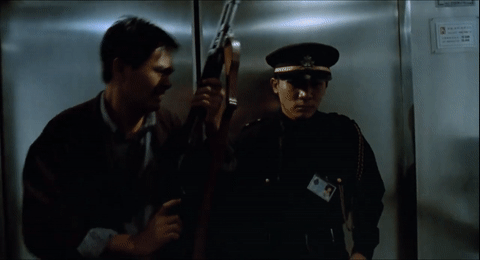
Firstly, it should be noted that it’s actually relatively hard to hit a target in Eureka firearm combat, doing so requires a fairly high roll. That means that participants are going to be doing a lot of missing. Besides just having a higher Firearms skill, the best way to increase one’s chance to hit is by firing more bullets in a single turn in the hopes that at least one of those shots will roll high enough to hit, which is why automatic weapons are more powerful than others: It usually only takes one single bullet hitting to disable a human target, so even with a low Firearms skill, firing more bullets at once greatly increases the chance that at least one will hit.
However, realistically, most shootouts in Eureka: Investigative Urban Fantasy will be done using semi-automatic pistols, which are only capable of firing a maximum of 2 shots per turn. We don’t want to make our combat be just and endless boring montra of “shoot, miss, shoot, miss, shoot, miss”.
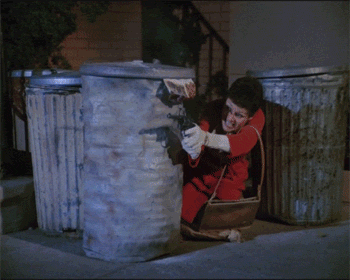
So, how do we make missed shots fun?
The answer is the Woo Roll.
The Woo Roll is one of the few rolls in Eureka that doesn’t use 2D6, it only uses 1 D6.
(Quick note for those unaware: While Eureka is NOT a PbtA game, it does use a similar system of “Failure, Partial Success, and Full Success”, three possible outcomes of a dice roll instead of just Success and Failure.)
When firing a gun, all bullets fired that turn are rolled separately (we have a special speed-rolling system for when you’re firing more than 3 bullets in one turn but that’s a different post). A Full Success(10+ on a 2D6 roll) is required to hit the intended target with any given bullet, a Partial Success(7-9) and a Failure(2-6) both miss. But this is where the Woo Roll comes in.
I’ll let the actual Eureka rulebook take it from here.
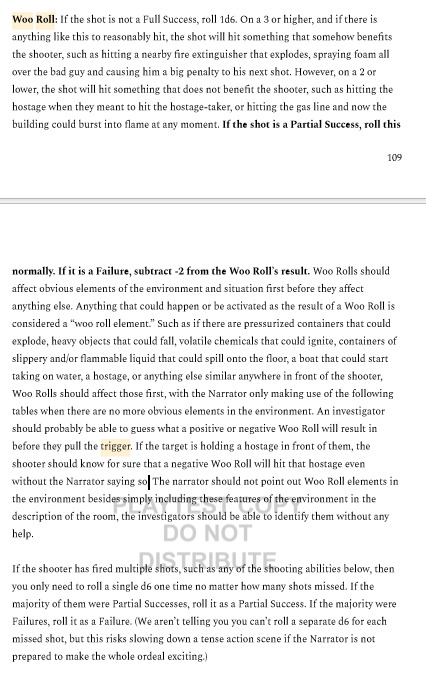
As you can see here, missed shots in Eureka still have some effect on the environment and situation, even if they do not kill their intended target. This ensures that a roll in firearm combat will always do something even if it is a miss, and reminds the players of one of the fundamental rules of gun safety: Don't just be sure of your target, be sure of what's behind your target! High-velocity lead doesn't stop being destructive just because it flew a little too far to the left!
The fact that a Woo Roll is much more likely to have a negative result if the shoot was a Failure vs a Partial Success means that handing someone a gun who has no idea how to use it can be more of a hazard than a benefit, but it's not impossible for them to get that one lucky shot that makes the difference. Likewise, a Woo Roll made from a Partial Success still has a small chance to cause disaster, so even very skilled shooters have to consider whether it's worth the risk to start firing bullets all over the place at all.
We also have tables the Narrator(Game Master) can roll on just in case the shootout runs out of Woo Roll Elements or it happens in place where no Woo Roll Elements would realistically be. Here's a sneak peak at the table for Negative Woo Rolls.

Note also that this is a 2D6 table, meaning that the results closest to 7 are much more likely than the results farthest from 7.
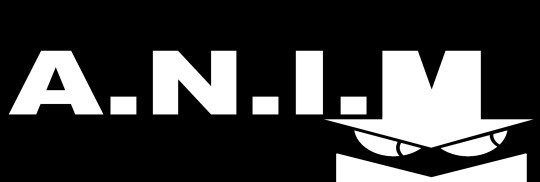
476 notes
·
View notes
Text
I have been considering narratives again...
There's an interesting progression in "Wherever You Go," from the scene of Stede at the pub to the scene between Ed and Izzy, as both Ed and Stede become increasingly trapped in stories that have the potential to destroy them, by men who don't understand them.
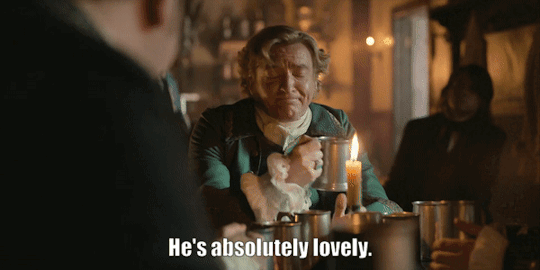
In the scene at the pub, Stede begins by asking for attention, but almost immediately balks when he receives it, thinking it is going to be used to harm him. He speaks to a man he hasn't spoken to since he was a child, and receives, for a moment, the accolades from other men that he's craved in the past. But almost immediately, he's drawn into telling a story, one that becomes increasingly detached from reality and that ultimately sends him into a spiral.
When Stede responds to a question about Blackbeard with "he's absolutely lovely," the men are disappointed. And Stede, desperate for attention, goes on: "...oh, and of course, a bloodthirsty killer, born of the devil. But I don't really like talking about him..."
Stede doesn't trust what he might say if he talks more about "Blackbeard," but he's already done damage to himself by narrating Ed back into the caricature that Ed so soundly rejected.
The statement is quickly followed by another man asking if he's ever killed anyone, and then doubting that he has. The story breaks. Stede's voice even changes, shifting from a bombastic, over-Anglicized accent to his regular voice, as though he were coming back to himself. And he doesn’t lie or tell a story:

"I've seen death. I've been the cause of death. It changes you. Forever."
Where he began the show wanting to change piracy from a "culture of abuse," the men of his own culture admire him for having been steeped in death. They want to know if Blackbeard is truly a monster, and are disappointed if he's not. They want Stede to be a killer, and mock him if he isn't.
Stede's drunkenness melts into self-loathing. He's been bought drinks for being a killer and for telling a story about Ed's violence, turning Ed, whom he last saw running off to find a boat to begin their new life together, into the monstrous caricature again. He knows the power that stories have over people and he’s now participating in transforming a man that he knows is kind and gentle and loving, who probably gave him his first truly loving kiss, back into an inhuman murderer.

The scene transitions into Izzy's attack on Ed, from Ed attempting to clean up the cabin and chat, to the caricature of Blackbeard, and finally the echoes of the crew, Stede's crew, calling for Edward. Izzy is a more explicit version of the underlying violence in the pub scene - the pressure on Ed to perform as Blackbeard, because "Edward better watch his fucking step."
The Blackbeard caricature itself works in tandem with Stede's description of Ed - from "he's absolutely lovely," a man in a dressing gown, grieving the loss of the man he loves, to "a bloodthirsty killer, born of the devil." Izzy is forcing Ed back into the caricature with threats and psychological abuse; Stede himself has narrated Ed into Blackbeard as he seeks the approval of men he barely knows. He has lied about who Ed is in order to better fit the story others want him to tell.
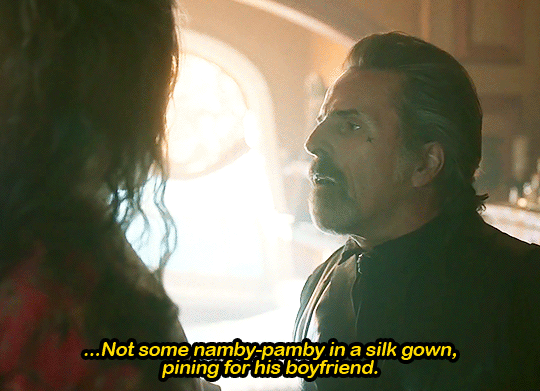
Both men are pushed into a spiral by vicious remarks that hit at the cores of their fears and insecurities. Both are threatened, or perceive that they're threatened, with physical violence - Izzy by getting into Ed's face, an act which we've seen produces a snap defensiveness, and Stede later when Doug grabs his shoulder.
I've written before how the potential of Stede's "Kraken" version of himself is shown and then shifted away from, when he's able to talk to Mary. But his descent is characterized by the lies he tells about Ed and the visceral memory of what real violence and death is. He’s trapped in the story of an aristocratic man who became a violent pirate, fought Izzy Hands, and knew Blackbeard, the bloodthirsty killer. And he knows that’s not his story at all. What he can tell Mary later is a story about love—a man whose name is Ed. He steps back into the right narrative.
Ed does not have a Mary. His descent only deepens, as he transforms himself into the caricature Izzy shoved in his face, trying (and ultimately failing) to shear away all the soft and gentle parts of himself to better fit the narrative, just as Stede does briefly in the pub and then at the gallery. The one thing he cannot destroy is his love for Stede.

Both Stede and Ed have been entrapped by the narratives around them—the gentleman pirate, the bloodthirsty killer. It’s when Stede gains control of his own story again that he becomes honest and sees himself, and is able to go back to sea to continue his authentic narrative, released from the stories with which others attempted to entrap him.
Ed still has to take over his own narrative. He can no longer see beyond the Kraken that he's been told is the only way he can exist, even as his love and his grief speak against it. The softness of his emotions are incompatible with the story he has to live. Unable to fit himself into that narrative, he decides to die instead, and solidify the story of the bloodthirsty killer. But his death allows him to face himself, and hear the stories he tells himself, and decide which of those stories he wants to manifest. Part of Stede’s role in season 2 is not to free Ed, but to help him free himself, to assure him that he’s loved for all that he is, and is not the story that others, including Stede himself, tell about him.
(gif by @llokilaufeyson)
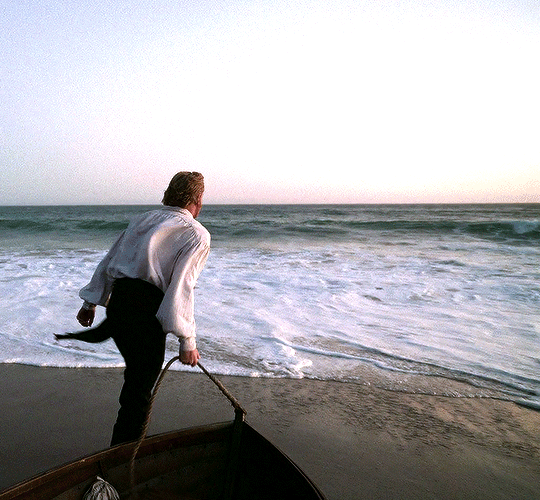
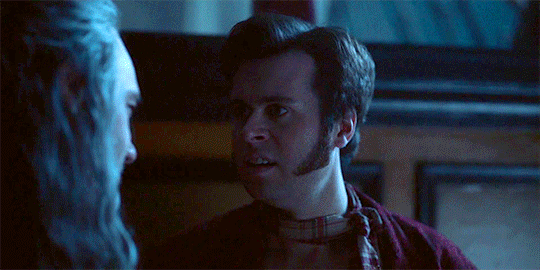

#ofmd#our flag means death#ofmd meta#stede bonnet#ed teach#edward teach#izzy hands#gentlebeard#blackbonnet#ofmd season 1#ofmd season 2#ok no more about that episode it makes me sad#long post#i know the longer ones can be a bit much#but i had things to say
159 notes
·
View notes
Text
The Muppets Present: Chess the Musical
Chess the Musical is an underrated gem, and we absolutely love it. The concert version, considered by most to be the definitive version, can be found on youtube in this playlist, which has nearly the entire complete concert (part 12 has been removed, but the only song missing is "The Deal (No Deal)") and I highly recommend you give it a listen, because the music is honestly top tier. The concert version is what we will be referencing here, since all the various stage versions are so different from each other (this show really suffered from over workshopping). If you're new here, take a moment to review our rules for casting. NOW, onto the show.
The Show
Chess the Musical is the story of the chess world championship tournament in 1979. The cold war is raging, and the two world champions are from the US and Soviet Union respectively. The story focuses on these two players and their personal lives and dramas set against the backdrop of the political strife between the east and west, as they are unwillingly used as pawns in the conflict.
The show has a core cast of seven characters and an ensemble with a few interesting standouts who can be filled out by muppets and humans alike. These are the key players:
Anatoly Sergievsky - "The Russian": The champion from Soviet Russia—a troubled husband and father who despises the propaganda and politics of the tournament.
Freddie Trumper -"The American": The champion from the United States—a self-absorbed, fame-and-fortune-seeking, short-tempered bad boy.
Florence Vassy - Freddie's strong-willed second and possible paramour, who is strained by Freddie's brashness and begins to feel a pull towards Anatoly as the tournament progresses.
Alexander Molokov - Anatoly's conniving second who is also a manipulative KGB agent and a major force in the political games being played behind the scenes.
Walter - A financial administrator in Freddie's delegation and in some versions a secret CIA agent who serves as a political counterpart to Molokov.
The Arbiter - The coldly objective, no-nonsense referee of the championship tournament and also the president of the International Chess Federation. He is essentially the narrator, the Voice of the chorus.
Svetlana Sergievskaya - Anatoly's estranged wife who, under Molokov's machinations, must persuade Anatoly to return to his homeland and family in the second act.
The Cast
Anatoly = Kermit. Kermit usually isn't the protagonist in Muppet adaptations, because the type of character he is just doesn't fit that role as neatly, but he's the perfect fit for Anatoly. Anatoly is competent in his own work, but is really out of his depth in the situation at large, and struggles to be true to himself amidst what he feels to be his duty. An arc that Kermit himself has played out in many a muppet film. Really, the only muppet who could adequately pull Anatoly off is Kermit himself.
Freddie = Gonzo. Freddie is bombastic, abrasive, quick to speak and slow to apologize, and overall extremely selfish. He walks into a room and his personality demands the spotlight immediately. I don't think I really need to give any other reasons why Gonzo should play this character, but I'll give one anyway: imagine Gonzo banging out "One Night in Bangkok" with Camilla and the Hens as the backup singers bawking out the chorus.
Florence = Miss Piggy. Yes, she's the only female muppet of note (who can speak english, sorry Henrietta), but also she'd genuinely be a good Florence. Florence is driven, a strong independent woman who don't need no man, but that doesn't mean she don't want one, and the fact that Anatoly is played by Kermit....well, you see where I'm going with this. Also, she and Freddie have an increasingly antagonistic relationship through the show that would be great to watch with Miss Piggy and Gonzo. Again, imagine her singing "The Model of Decorum and Tranquility" and getting more and more frustrated and gravelly in her delivery. And don't forget to picture Kermit in place of Josh Groben in that scene too...again, the dynamics are top tier here.
Svetlana = Miss Piggy. I'm invoking rule 5, not only because again, the lack of other english speaking female muppets, but because I love the idea of two Miss Piggies both singing for Kermit's attention and lamenting that he'll never see her the way she sees him, that his attention will always go to his work first. "I Know Him So Well" is a duet between the two women about Anatoly, and imagine two Miss Piggies singing this in duet with each other, each knowing that the other has something to offer that she doesn't have, but also knowing that even that isn't enough, that Anatoly (Kermit) will never be able to commit to her the way she wants to to him.
Molokov = Uncle Deadly. Honestly I don't have a lot to say about this choice, it's just Perfect. Molokov already borders on cartoonishly evil, he is an immediately untrustworthy character and everyone knows it, he's the world's worst spy. Uncle Deadly is a shoe in for the role and I'll hear nothing else about it. (Also, while generally irrelevant in casting muppets in a musical, since you can re-key as needed, Uncle Deadly already fits Molokov's voice type)
Walter = Sam the Eagle. While Walter is not as overtly patriotic as Sam, in adaptation, there should be a muppet who is equally as enthusiastic for his country as Molokov is for the Soviet Union. Walter is in some ways the least emotionally complex character aside from the Arbiter, he exists to serve the plot and the ways the plot creates character conflict for Anatoly, Freddie, and Florence, so Sam (who is generally a one note patriot character) fits the role nicely. Also, just like Uncle Deadly, he fits the voice type perfectly.
The Arbiter = Daniel Craig. I call upon the power of the One Human Celebrity. Daniel Craig would be perfect for a muppet adaptation of The Arbiter, he is the type of human actor who could be surrounded by muppets and you'd 100% believe it. The Arbiter's songs require some gusto, but Craig can carry a tune and if you give him a vocal coach and 6 weeks (and re-key his solo), I think he'd be great. However, this casting ONLY works if there are NO OTHER HUMANS in the chess federation. Daniel Craig must be surrounded by muppets at all time. Just look at his solo, and tell me that it wouldn't be the best thing ever to watch Daniel Craig do this while flanked by dancing muppets.
Additional Bit Parts:
Statler and Waldorf as The Consulate. When Kermit's Anatoly is speaking to them about defecting to the UK, imagine them having this exchange. You could either rewrite the song to be a duet OR have two Statlers and two Waldorfs to fill out the quartet.
Non-Celebrity Human as The Soviet Machine. This must be a big, nondescript burly man who can sing one glorious falsetto note. He must stand stoically as evil muppets dance around and sing the Soviet Machine. Moopets can fill out the Soviet chorus line.
The Ensemble: Merano and Bangkok both have human backup dancers and chorus members as well as muppet, because these are location setting songs, and you want to establish that humans are here in this world. Mike Tyson can have a celebrity cameo in Bangkok for old time's sake.
Chess Dancers: the Hens and the Penguins supplement the human chess dancers that take stage during the two chess matches.
Reporters: a mix of humans and muppets, but no cameos during this scene, it's Gonzo's first big solo and the spotlight needs to be on him.
Fozzie Bear as the governer of Merano and as an authority figure in Bangkok: his presence in Bangkok is commented on and he loudly says "Oh no, you must be thinking of my brother!"
And that's The Muppets Present: Chess the Musical!
What other celebrity cameos would you add to the show? We'd love to read your thoughts! Also let us know if you have another musical or movie you'd like to see a muppet fancast of, we love doing these!
#the muppets present#the muppets present: chess the musical#chess the musical#anatoly sergievsky#freddie trumper#florence vassy#kermit the frog#gonzo the great#miss piggy#uncle deadly#fozzie bear#sam the eagle#daniel craig#statler and waldorf#musicals#muppets#jim henson's muppets
108 notes
·
View notes
Note
#mahoyosweep is getting a movie, congrats, you did it
The Mahoyo movie was announced years ago (before we even knew we would be getting an English translation) though it has been heavily delayed since iirc it was originally announced for 2023 and it was announced on 2021.
To be honest I'm not quite sure how well Ufotable can capture it. Mahoyo already looks good as a VN, but also contains a lot of slow, domestic life scenes that aren't going to be as great to watch as it is to read where you have narration to accompany you.
This isn't the Ufotable that animated Kara No Kyoukai anymore. I've noticed their productions no longer do the slow, lingering scenes or even the focus on character movements during fight scenes. It's all ultraflashy particle effects and meticulously rendered environments and character models.
This worked really well with something like Demon Slayer, but with the Heaven's Feel movies for example, scenes like Saber Alter vs Berserker legitimately got tiring for me to watch. It was funny to joke "Behold the power of tax evasion" while my eyes got obliterated by ten thousand flashes a second, but looking back on it I didn't like how even scenes like Shirou hugging Sakura in the rain had all these bombastic camera movements and effects.
I'm hoping they show a little more restraint with Mahoyo. It's a sleepy town filled with inhabitants who have no idea the supernatural exists, and it's Aoko and Alice's job to keep it that way. There will be a time for Ufotable to do its thing, but it's specifically all the way in the Night of the Witches chapter and I don't want to see the adaptation getting overexcited about Soujuurou learning how telephones work.
54 notes
·
View notes
Text
So I'm listening to Fulgrim (the 5th book of the Horus Heresy, not his primarch novel) and there's just... there's just a lot going on here.
This is the only black library novel i've seen that has sex in it and I understand why it scared so many people into thinking that 40k should never even hold hands and no I'm not talking about kinky space marines but rather a scene with the world's most autistic sculptor having the worst "hey want to bone?" speech told to him by a singer character so badly written the audiobook narrator doesn't even take her seriously.
It has scenes more homoerotic than gay sex and so far none of them have involve Fulgrim himself despite the memes. Seriously, they forgot to staple on "My son/my brother" onto half of the scenes like they typically do when they realize they've written romance in Black Library's unique version of "No Homo".
I hinted to it in another post but the first time we ever see the primarch of the Iron Hands he is not just naked but oiled up only to say "you are the soothing ice to my raging fire" in the same scene.
But the thing that's frying my brain is the choice of voices the narrator did. I managed to get past fulgrim being haughty+nasally, the bombast of the HR nightmare of a singer I mentioned above, but let me point to just how sexualized Ferrus Manus is above before dropping the bombshell on you that the narrator is doing an extremely close likeness to Mark Hammil's Joker during those scenes.
This book is meandering and it's the worst of the Horus Heresy so far and probably the worst one I'll finish since I have no interest in Battle for the Abyss, but I have to finish it. It's buckwild in creative decisions and there are small bits that I find fascinating but otherwise it's just everything else that's going on with it that just... this really happened and the audiobook version also was approved like this.
#warhammer 40k#Warhammer#i'm gonna need to read something actually good after this one but for now we continue on it
59 notes
·
View notes
Text
listen if you love amc iwtv and haven’t read the books I’m begging you to read The Vampire Lestat. I know there’s hardcore fans out there who love book one and think you need to read them all in order and I respect the grind, I really do. But.
The Vampire Lestat changed me.
Everything about it was so instantly fascinating. The My Immortal ass prologue, the eloquent writing, the struggles with religion, the history, the overt queerness (this was pre amc iwtv so all I had was the movie ok 😭), the campiness, the quotes that run through my head night and day. Lestat is a bombastic protagonist who’s desperate to survive and find a single ounce of love in a godless world. You get to see a new side of Armand, you get Nicki, you get Lestat’s mother (who I could write a whole essay on). You get the Loustat reunion in all its emotionally glory. If you want to know why the went so hard with the show I implore you to read that book.
Interview is good but TVL is powerful. Where Interview was full of grief, TVL is full of hope and pessimism and defiance that rose from the ashes of that grief. You can feel how much Anne changed in the 7 years between the two books not just as an author but a person. Is it perfect? No of course not, its kind of insane at times. But this is the Vampire Chronicles we’re talking about, I think that’s a given (and, at many times, a positive).
((Edit because I was sleep deprived while writing this and left some stuff out: This is mostly aimed at ppl who are on the fence about reading the books after watching the show or who have tried to read Interview and weren't too grabbed by it. I would potentially recommend watching the movie, skimming book 1 and then reading book 2. The differences in Anne's writing style and opinions on religion are genuinely fascinating to read first hand. The stand out part of experiencing the two books together is how different Louis and Lestat's accounts are. It's an incredibly unique case of both protagonists being unreliable narrators that I haven't seen in other media. This post is largely just me going "hey, if you tried Interview and it made you not want to read more even though you really enjoy the ambiance/concept then TVL might be more up your alley." If you want an in-depth look into the series and if you want to catch/compare everything with the tv show, then absolutely read the first book! I did and I don't regret it, even though I do feel like book 2 is stronger. Tryna keep this short cuz I love this series and I have a million things to say hjdhsfhjkdhjh))
#Iwtv#interview with the vampire#lestat de lioncourt#amc interview with the vampire#louis de pointe du lac#iwtv claudia#amc iwtv#iwtv armand#the vampire lestat#the vampire chronicles#Anne rice#gabrielle de lioncourt#literature#lgbtq representation#queer books
96 notes
·
View notes
Text
MTMTE: the Musical, arc one:
See the Galaxy. Opening song by Rodimus, breaks now and then to put in the actual narration of the speech he gives in the comics.
And What Then? Tailgate and Cyclonus duet reminiscing about old Cybertron and explaining the war.
Do No Harm. Starts as the Delphi crew singing about a medic's life. Sort of in medias res, as the Lost Lighters show up mid-song. Pharma sings a very sarcastic reprise before attempting his escape.
Stuck with Us. Introduction of the Scavs as sung to Fulcrum. Very 2000s boy band style, except Krok and Crankcase don't want to be in it and Misfire keeps switching which instrument he's playing.
DJD don't get a song to indicate that they're the Serious Guys.
Hostage Situation. Whirl, FortMax and Rung in the office, although it's more like a rap battle that Rung keeps trying to referee.
Countdown. Very stressed duet between Rewind and Tailgate that gets faster and more panicky as they go.
Phase Six. Villain song for Overlord, first sung about him by Chromedome, with Overlord joining in as it goes and he takes over the mental link. Has a bombastic big-band theme.
Fully Deserved. Tyrest's villain song. Starts off singing it to Minimus after stripping the armor, reprises it in Getaway's flashback and when Rodimus and co burst in. Also, we're changing it so he explicitly wants to find Adaptus who will 'purify' the Cybertronians, so that the last arc makes more sense.
Very quiet reprise of And What Then? to close off the arc.
28 notes
·
View notes
Note
ur blog is soo helpful !!!! ive been looking into writing more lately and this is like a godsend <3 i was wondering if u could do some starter tips?? like stuff to avoid as a new writer :o ps. hope ur having a wonderful week!!!
ahhh, hello!! this is such a sweet message, and thank you, i hope you have a fruitful week ahead too ♡ i'm so glad you're writing more lately- i'll def do my best to provide some starter tips (though i'm really also a starter myself 😅 so i hope you like these, and feel free to let me know what you think!) also, just to put it out there that these are what i found helpful personally / what i think will be helpful, and may / may not resonate with everyone. Also, this topic is soooo broad and there are a million things that can be covered, but for now I'll just keep it short and go with stuff to avoid (or rather, approach differently) as per request. if you / anyone else would like another post for more specific writing tips, feel free to drop it in my ask box!
Some general writing tips — stuff to avoid; little things to not overdo
over-planning
overusing fancy vocabulary
over-describing
over-criticising your work
over-comparing
more details under the cut!
Over-planning
— plan the general outline, direction of your plot, message of your story, characters and their rough personalities; yes, do all that well! good planning makes for a good story, but i think it's helpful to remember that sometimes things don't pan out the way we envision them to. and it's important to let certain things go, appropriately of course. if your initial storyline doesn't quite fit the characterisation of the protagonist etc (and vice versa), then perhaps it's time to rethink things — and NOT be too hard-up about it. [tldr: be flexible!]
Overusing bombastic vocabulary
— i'm sure you've come across millions of writing advice pieces that aim to spruce up your vocabulary with bombastic phrases. by all means go ahead and pick a few that fit the mood and style of your writing. otherwise, i'd say that sometimes, less is more. throwing in fancy words for the sake of it may not be as helpful as you think. there should be a fine balance between using words that add flavour + help to illustrate nuances and using words to make your piece seem complex. simplicity goes a long way, as i've learnt. but having said that, building up a solid repertoire of vocabulary / good phrases is always helpful, the key thing is using those phrases in the right context. definitely easier said than done, so i suggest reading your favourite author's works couple of times through and pick up their way of using language to their advantage.
Over-describing
— narration, descriptive language are great, and can really help to nudge your story in the right direction. it helps set the scene, the mood, and all these are critical in writing... BUT! not the same can be applied to describing actions. not every single action has to be written out explicitly — an example: she walks over to the kitchen, turns around, and opens the refrigerator. she then takes out a canned drink, and places the drink on the countertop... etc — you get the point. some things can be left implied, rather than explicit.
Over-criticising your work
— ahh, the age-old piece of advice. i do it all the time, and you probably do too... sometimes, being harsh on yourself and on your work may seem like the only way to better yourself and push your limits, but often times, i personally find that this is counter-productive both on the physical and mental front. it wears you down, it is a nidus for dejection and negative vibes. i think the way i try to get round this is by taking pride in my own work; telling myself that 'this is something i wrote, these are my ideas put into prose, these are my thoughts written on paper'. the caveat here is that avoiding being over-critical of your work DOES NOT and should not mean avoiding proofreading. proofreading is extremely crucial to check for grammatical and structural errors (i recommend doing it once or twice yourself, and if possible, getting a fresh pair of eyes to do the same).
Over-comparing
— this ties in nicely with the previous point. take pride in your work! this is something original from you and you only, written in your unique style. having authors/writers whom you look up to is essential in moulding your writing style and habits, but should not be the sole focus when you write. remember that every writer is different, every piece of writing is different; this goes even for pieces with similar plots / tropes / character personalities. nuances, subtleties and underlying messages can come through very differently when written by different people. after all, our life journeys are all personal, which is a factor influencing the way we convey messages across through the written word.
and... that's it for now! i really hope that this helps. honestly, i'm scratching the surface here, and there are lots more i can talk about when i have more braincells >_<
feel free to drop any other requests or questions in my ask if you'd like ♡
#writing tips#writing resources#writing inspo#writing inspiration#writing advice#creative writing#creative writing prompts#writing prompts#prompts#writerscommunity#writeblr#fanfiction prompts#new writer boost#writer#writing dialogue#bunnyswritings#bunnyrequests#bunnyrambles
181 notes
·
View notes
Text
Psycho Analysis: Freaky Fred

(WARNING! This analysis is... NAUGHTY!)
Hello dear reader, this is Fred.
You hear the words that are in his head.
To Courage the dog he is a threat,
because he’s very… naughty.
In Courage the Cowardly Dog, you see,
Fred appeared and definitely
left a mark on you and me
by being very... naughty.
So let's take a look at this creepy man,
and hopefully you'll understand
why this guy has garnered tons of fans
despite him being... naughty.
Motivation/Goals:
Fred’s a man of simple needs.
He wants to cut hair, indeed!
And his efforts would likely succeed
if he weren’t so… naughty.
He has a compulsion, you know.
He sees hair and it’s time to go!
And so he spends the\is episode of the show
being very naughty.
Performance: Paul Schoeffler is the man, you know!
He voiced Le Quack, Katz and Big Toe!
The Cajun Fox, Zalost, the Snowman, oh,
he played characters who were… naughty.
He was quite good at what he had to do,
even playing Dr. Vindaloo!
And he played our boy Fred, it’s true,
with a performance that was… quite naughty.
Final Fate: After shaving Courage’s hair,
the orderlies escort him out of there.
One could argue the ending’s unfair.
Fred was only… a little naughty.
Evilness: Is Fred evil? Who can say?
I certainly don’t see him that way.
Really, at the end of the day,
the worst you can call him is… naughty.
He shaves off hair against people’s will
because it gives him perverted thrills.
He doesn’t maim or harm or kill,
he’s genuinely just naughty.
So I suppose a 1.5/10’s the score.
I can’t really justify much more.
He’s not cruel or deadly to the core,
he’s a weird guy who’s naughty.
Best Quote: The opening lines of his sole appearance of course,
which he delivers with no remorse
as he outlines his action’s course
and explains that he is… NAUGHTY:
“Hello, new friend. My name is Fred.
The words you hear are in my head.
I say, I said my name is Fred,
and I've been... very naughty.”
Final Thoughts & Score: Alright, time to drop the rhyming act so I can actually really talk about Fred. And boy, is he ever interesting to talk about! Courage is really a cavalcade of amazing one-shot antagonists, but Fred is easily one of the best and most memorable.
A huge part of that is probably down to his single appearance being narrated from his point of view. He’s the rare Courage villain that gives us explicit insight to his thought process and why he does what he does, and what he does is… extremely strange and even suggestive. His compulsion is so strange and how he narrates it and refers to his actions really build him up to feel worse and creepier than he actually is. He’s not trying to hurt Courage in any way, he’s just trying to exercise his bizarre fetish like a G-rated Yoshikage Kira. There's a lot of ways you could read into this compulsion, but t really does make him stand out as a character due to how unique it is and how it's implemented into the story.
I think what also helps is Schoeffler giving one of his best performances on the show. Like yes, Katz and Le Quack are great, and Vindaloo is a funny meme man, but Fred is just a truly iconic character with such a bombastic and sophisticated narration that I really think he’s a contender for the best character the man played. On top of that we have a fantastic design, with his crazy hair and way-too-wide grin; literally every aspect of this guy is perfect.
But at the end of it all, you have to remember that Fred isn’t actually evil, no matter how much he seems to insist he is. At worst, he’s an anti-villain, and even then it’s in name only; the dude is just a freaky weirdo who looks like Betelgeuse and has a strange fetish he can’t help but act out on, and at worst his actions are annoying and inconvenient as opposed to horribly destructive or deadly. Like, oh no, your hair’s gone! It’ll grow back, whatever. He may be Sweeney Todd for kids, but this barber ain’t a demon; he’s just a fucking weirdo. And I love him for it.
A 9.5/10 is the score he gets,
A memorable antagonist, one of the best.
His narration will never leave your head,
and isn’t that just…
NAUGHTY?
23 notes
·
View notes
Note
jumping off that post if you dont mind butas someone whos been watching btas for the first time recently, as an adult, I have to say that I dont really get the hype. Like theres been a handful of truly excelent episodes yes, the show looks good and it has a very easy watching vibe that good kids serials should have. But I feel like I must be missing something giving just how much its hyped up as peak superhero media when most episodes seem like stardard, if very solid, kids serial affair
An excellent question!
The answer is: you're looking at The Blueprint. The base. Classic superhero cartoons were solid, sliding action with cutaway impact frames and often played out more like read-along comic books. Dialogue was dramatic, delivered in that bombastic, attention-grabbing style of the old radio programs, meant to convey excitement above any other emotion. The dialogue between exposition also tended to sound more like when a book narrator puts on a different voice for a character.
Batman changed the game. The animation was fluid and dynamic, the visual tone dark and dreary, and the voicework was (mostly) far more suited for stage than radio. Men fought with swords, blows landed, a chair could easily be picked up and swung at any time. There was no laugh track, no silly music, not even a catchy jingle--this show was SERIOUS about its material, which fit perfectly into the exciting, action-craving culture of the nineties.
But below all of that was gravitas. Maturity and mystery spun the show into more than just gadgets and fistfights--there was emotional weight behind episodes, fear and anguish on the faces of our characters. And sometimes a laughing clown in a suit appeared to shake that up.
All of this was backed by a symphonic score, too. This led to many wordless moments that further pushed the demands of animation to tell the story.
You have to imagine this as a NEW medium. A triumphant return of comic book heroes.
21 notes
·
View notes
Text
A beginner’s guide to symphonic metal in 5 albums
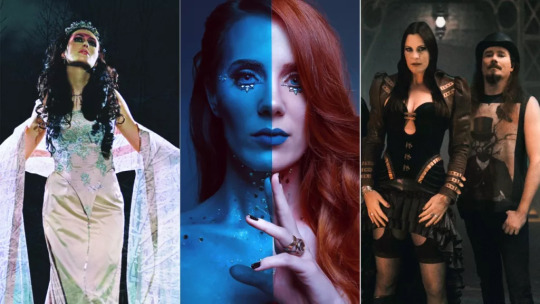
Few genres do grandiose like symphonic metal. As the name suggests, it marries the scope and ambition of classical music to the power of metal. The result is orchestral, opulent and sometimes OTT, but it’s a hard heart that is completely resistant to it.
The seeds of the sound were sown in the 80s, when diverse trailblazers such as Celtic Frost and Savatage began incorporating orchestral instruments into their music. But it began to accelerate in the late 1990s, with bands such as Therion, Nightwish, Within Temptation and cult favourites Haggard began to properly fuse the two genres.
Today, symphonic metal has become an unlikely commercial force. Nightwish and Within Temptation are festival headliners, while a constant stream of newer bands have emerged in their wake. For anyone who is new to this grandest of genres, these are the five albums to start with.
Therion – Secret Of The Runes (2001)

Therion remain the original and – the purists would have you believe – the best of all the symphonic metal acts. Named in honour of Celtic Frost’s second album To Mega Therion, the Swedes have been led by multi-instrumentalist Christofer Johnsson since 1987. While others have prospered by ‘sexing-up’ the genre’s principles, the Therion experience remains a pure one – sackcloth and ashes, almost. Take our word, it’s a beautiful thing.
After Forever – Decipher (2001)

The second album from this pioneering and much-missed Dutch outfit, who ran from 1995 to 2009, Decipher employed live classical instruments and a full choir to complement the stirring soprano delivery of Floor Jansen (now, of course, with Nightwish). Soon afterwards Mark Jansen quit, taking his growled co-vocals along to the guitarist’s next band of note, Epica. The album’s grandiose arrangements still sound masterful today.
Within Temptation – The Silent Force (2004)
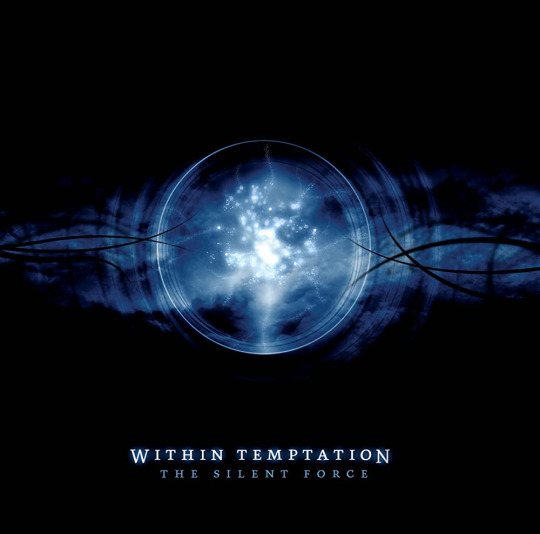
Although you’re likely to be distracted by the captivating strength of Sharon den Adel’s upfront vocal dynamism, Within Temptation’s symphonic aspirations reached their most querulously romantic apex on this goosebump-inducing masterwork of the form. Although the guitars were louder and crunchier than on 2000’s Mother Earth, and the open- hearted pop savvy was at full widescreen pelt, this 2004 follow-up confirmed the band’s special affinity for wizardly orchestral bombast, here performed by the Ego Works Session Orchestra, under the noted Russian conductor Felix Korobov.
Epica – The Quantum Enigma (2014)

Formed by former After Forever guitarist Mark Jansen, Epica played a crucial part in the development of symphonic metal via a string of consistently impressive releases, but with The Quantum Enigma – their sixth studio record – the Dutch band raised the bar to a whole different level, hiring a live chamber choir and a string orchestra to enhance a collection of tunes that is uniformly strong. Throw in the soaring vocals of flame-haired mezzo-soprano Simone Simons and the results are seismic.
Nightwish – Endless Forms Most Beautiful (2015)
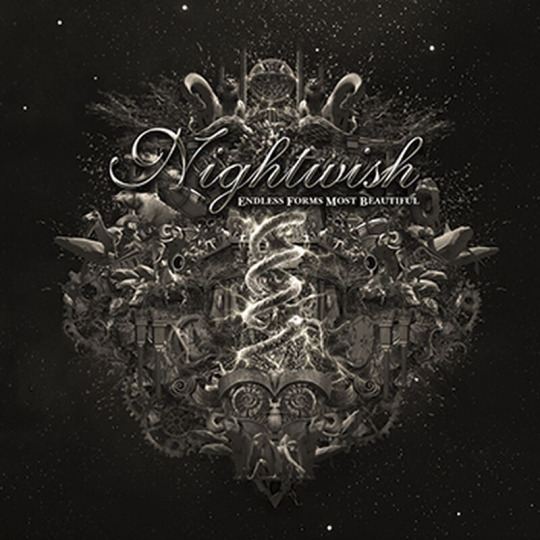
You could pick anything from 2000’s Wishmaster onwards, but the Finns’ first album with Floor Jansen represents Peak Nightwish in terms of a grandiosity. A high-concept exploration of evolutionary science, featuring narration from scientist Richard Dawkins, it’s an absolute triumph. From the full-pelt throttle of Shudder Before The Beautiful and cinematic bombast of Weak Fantasy to the life affirming anthemia of Alpenglow, it’s a constant stream of brilliance. Then there’s The Greatest Show On Earth, a 25-minute show-stopper most bands could only dream of writing. It’s no surprise this was the record that turned Nightwish into festival and arena headliners.
#therion#secret of the runes#after forever#decipher#within temptation#the silent force#epica#the quantum enigma#nightwish#endless forms most beautiful
132 notes
·
View notes
Text
Arctic Monkeys’ Alex Turner: ‘I’m comfortable with the idea that things don’t have to be a pop song’
The most influential frontman of his generation is also the least at ease with it. He discusses abandoning rock norms, singing from the gut and treading the fine line between cryptic and gooey on new album The Car
Not for the first time, Alex Turner has lost his train of thought. In a booth of a downtown Manhattan diner, the Arctic Monkeys frontman is hunched forward, grasping for words to describe their new album – a black-tie orgy of cinematic soul, lurid funk and perfumed 60s strings. A waiter swoops in to save him. Would Turner like some milk for his coffee? “I’ll have a bit of milk, yes please,” he says. She returns a minute later, and Turner, having strung together no more than half a sentence, eagerly tops up his mug. “OK,” he says, rubbing his hands. “OK. Now we’ve got it.”
During our two-hour conversation, the affable introvert is determinedly, delightfully animated: he bashes imaginary woodblocks, sprawls across his moulded seat, clasps thin air and shakes it like a Magic 8 Ball. His turquoise jumper’s V-neck reveals a thin gold necklace, which he fondles while digressing into monologues on the genius of composer David Axelrod. Turner has been portrayed as aloof and evasive, but he is a man of pensive silences – an ambivalent overthinker trapped in an eccentric entertainer’s body.
He tries to describe orchestrating that new album, The Car. “Rather than strings on top of rock,” he says finally, “I was interested in switching the ‘rock band’ bit on and off.” He tweaks levels on a mixing desk in his mind’s eye. “With the Sculptures song” – the dizzyingly gorgeous Sculptures of Anything Goes – “the ‘rock band’ fader comes up for two bars here and there, and then it’s switched back off.”
He inspects this thought, then flings out his arms and freezes. He looks like a magician alarmed the rabbit is missing from his hat. Slowly, he reboots. “And I don’t remember doing that quite so … deliberately before,” he concludes. A boyish smile. “Phew!” He clutches his chest. “I didn’t think I was gonna get to the end of that sentence.”
But Turner, 36, is nothing if not acutely self-aware and very funny with it. But surely this superstar, whose new haircuts trend on Twitter, is too famous to be such a brooder. Each of his eight albums, including the two with the Last Shadow Puppets, his project with friend Miles Kane, has debuted at No 1 in the UK. Since its 2013 release, the Monkeys’ juggernaut of a fifth album, AM, has taken just one week’s holiday from the UK Top 100. It spent most of September back inside the Top 10, after the band headlined Reading and Leeds festivals.
The AM era lasted a couple of years – long enough for the Sheffield boys’ image as pomade-slick, leather-jacketed Los Angeles dirtbags to stick in the public memory for good. So when Arctic Monkeys got back to mischief, with 2018’s fantastically strange Tranquility Base Hotel & Casino, fans were confounded. Turner had assembled a cast of distractible narrators to interrogate modern society – technology, politics, hyperreal LA – in a retro-futurist concept album set in a lunar colony. On stage, dressed like a 70s geography teacher, he now addressed crowds with comical formality. Sceptics said he had lost the plot, calling it an act of self-sabotage – or worse, a class betrayal. In Sheffield, somebody graffitied a coffin on a gate at Hunter’s Bar – the area immortalised in Fake Tales of San Francisco. “Hey Alex,” the caption read. “How’s California?”
While tighter and grander than its predecessor, Arctic Monkeys’ seventh album is blissfully unconcerned with correcting the record. It swings from a louche, movie-soundtrack intro to Portishead-stark noir, improbably catchy yacht-funk and the poppy bombast of Elliott Smith’s LA era. At times, Turner dips into a slick, syrupy croon, though he recoils from the word’s stuffy baggage.
“You sort of wish there was a way around the things attached to that word [croon],” he says. “But yeah, everything’s come down a little bit. And I like that, because if it’s come down here” – he runs a finger from his forehead to his ribcage – “it’s out of your head. It’s more coming from …”
He hunts for the word. The heart? I suggest, as he flings invisible confetti from his chest.
“The heart,” he agrees, sounding a bit uncomfortable. “Or even better: the gut.”
Turner is not all the way out of his head just yet. He sings much of The Car in a falsetto that trapezes between Sly Stone and David Byrne. The anxious melodies strike a delicate balance with the sumptuous strings. “You don’t want it to get gooey,” he reasons. “But it’s nice to get to the perimeter of that. There may have been discussions about where that line is, and how many times you can get close to it.”
Still, Turner’s bamboozling lyrics preclude slushiness. Traces of Yorkshire chansonnier Jake Thackray and punk-poet John Cooper Clarke remain, but Turner’s bon mots are now elaborately encrypted. Struggle though you may to picture festival crowds bellowing some of the lyrics here (Hello You opens: “Lego Napoleon movie / written in noble gas-filled glass tubes / underlined in sparks”), you can never rule it out. The similarly inscrutable 505, an album cut from 2007’s Favourite Worst Nightmare, recently caused a sensation on TikTok.
Maybe tackling impenetrable lyrics helps bring us deeper into a song, I suggest. Turner laughs. “I like the idea of you putting that in here and everybody going: ‘Ah, I dunno, sounds tough. We won’t give it a listen after all.’” He admits to scribbling notes in his printed lyric book, teasing out themes mysterious even to him. “The Annotated Lyrics,” he jokes, imitating a 1950s ad man. “Get that stocking filler out for Christmas.”
From the moment in the mid-00s when Arctic Monkeys blew up, Turner has longed to go incognito. He strode undercover into his new public life, a frightened teenager hiding inside a big swagger, collecting shiny awards for songs he had written for mates of mates in pub backrooms. In 2006, the band released what was then the UK’s all-time fastest-selling debut album – a death sentence for his man-of-the-people, kitchen-sink writing style.
On 2009’s Humbug, co-produced by Queens of the Stone Age’s Josh Homme, Turner escaped into a rock archetype. The band’s hairier second phase amped up the sleaze and elliptical lyrics, culminating in the darkly spectacular AM. By this point, the bequiffed Turner was harder to read, particularly in his divisive speech at the 2014 Brit Awards. “That rock’n’roll, eh,” he drawled with indeterminate sincerity. “It’s always waiting there, just around the corner. Ready to make its way back through the sludge and smash through the glass ceiling, looking better than ever. Yeah, that rock’n’roll …”
At the mention of the speech, and its concluding mic drop, Turner winces, sucking air through his teeth. But, I say, since Tranquility, the moment looks more like performance art – perhaps it anticipated his scepticism towards the rock construct. He listens intently, then, on the last point, springs back as if harpooned to his seat. “That’s interesting, yeah, yeah, yeah,” he says, head bobbing vigorously. He chews it over, talking half to himself. “So we’re saying it’s tied to AM, because of the haircut and … that performer …”
He seems unsure just how much of himself was in the mic-dropping rock star.
“When you think about that, and the clothes,” he continues, “I wasn’t doing that with [fourth album] Suck It and See or [third] Humbug. It wasn’t grease in the hair.” He pauses again, considering each album’s “performer” – always a fractured reflection of himself. “Normally, the record you make encourages a certain style of performance. But thinking about the performer in relation to Tranquility, or even this thing” – meaning the new album – “I have considered that you can invert that. The performer can influence the music, rather than the other way around.”
The Car’s performer more closely resembles the Turner I meet today: brilliant company but palpably self-scrutinising – a far cry from the headstrong Brits character. Turner wrote most of the album at the piano, souping up Tranquility’s vanquished lounge singer with a spritz of Rat Pack razzmatazz. Turner and the band’s producer, James Ford, separately drafted string arrangements that the composer Bridget Samuels simplified and edited.
Turner seems mildly embarrassed by the prospect of using strings live (a proposed orchestral TV special was deemed too predictable), but the album sounds just as exquisite without them. During a stunning show at Brooklyn’s Kings theatre the week of our interview, the band premiere three songs: the resplendent There’d Better Be a Mirrorball, a fingerpicked heart-warmer called Mr Schwartz and soon-to-be staple Body Paint, whose gnomic chorus crowdsurfs along a festival-slaying melody: “Straight from the cover shoot,” Turner coos, “There’s still a trace of body paint / On your legs and on your arms and on your face.”
As with 505 or Crying Lightning, it is a head-scratcher fated for mass seduction. “Not exactly what you’d imagine singing over the loud bit,” Turner concurs, chuckling. The body paint could represent almost anything: a literal costume; a stubborn artistic persona; or in a spunkier reading, the residue of an illicit affair. “But it’s as much about the musical ideas as the lyrics,” Turner says. “On Mirrorball, before the words even come in, that instrumental piece [establishes] the feel of the record”: wistful, enigmatic, acutely reminiscent of 70s European cinema. “All right,” Turner recalls thinking after writing it in 2020. “This feels like how the next record starts.”
Turner now lives between London and Paris with the French singer-songwriter Louise Verneuil. He composed most of the album alone, using the technique he road-tested on AM and adopted wholesale on Tranquility: compose, demo, inspect, tweak and re-record, repeat the process to death and eventually add drums and vintage keyboards. Finally: bring in the band.
In the summer of 2021, Arctic Monkeys convened at Butley Priory, a wedding venue and makeshift studio in Suffolk. On a whim, Turner brought his 60mm video camera to document the sessions, later compiling his footage for the impressively chic There’d Better Be a Mirrorball video. “That gave everybody a bit of room,” he says. “James [Ford] definitely didn’t mind that I had something to play with.” During downtime, the band watched the Euros and nipped outdoors for kickabouts. “I do get caught up in those tournaments. Something about that feeling connects you to when you were a kid. You find yourself thinking about Euro 96. And then it ends, and you almost feel a bit mad for feeling like that.”
That proximity to yesteryear haunts the record, not least in the creeping jazz element, which evokes his jazz-musician dad’s records and saxophone noodlings in Turner’s childhood home. “It came out the front in Tranquility, and there’s definitely a bit more this time,” he says. “It’s one of those things that you try to fly quite close to without [crossing over]. That music you’re around when you’re a kid always has a special power.”
Strikingly, the more sentimentality creeps into the music, the less forthright emotion surfaces in Turner’s lyrics. I ask if he is equally withholding in private – does he find it harder, as he gets older, to tell people he loves them? He laughs. “No, no, I don’t think so. I like to think that outside songwriting, I find it more straightforward to be direct.” He is prone to embarrassment by lyrics from bygone years. Perhaps the more elemental style, with fewer obvious footholds, helps minimise the cringing? “I like the idea that I’m getting better at the … I sort of want to say distillation.” He handles the word cautiously. “I think I’m better at picking the moment to expose the idea behind the song. But you have to be comfortable with the idea that things don’t have to be a pop song.”
What has remained constant since the beginning, he says, “is the instinct of it all”. Even the meticulous experiments of Tranquility and The Car stem from his faith in his bloody-minded intuition. I remind him of something he said, aged 19, about the perils of fame: “When you want it and you get obsessive, you mould yourself to be whatever they want you to be.”
He laughs. “It’s a heck of a time to drop a quote from 2005, when we’re talking about stuff to be embarrassed about.” But he agrees Arctic Monkeys’ instincts and gang mentality insulated them from industry games and greed. “The name of the band seems to allude to how limited the expectations were,” he adds. “If you realised you were gonna be doing this 20 years later, you might’ve had another hour in that meeting.”
Fatalistic fans have already forecast the band’s demise based on the single’s valedictory lyrics, but while the album abounds with goodbyes, Turner seems full of optimism about the future. His bandmates are, too. “You can tell when they’re excited and when there’s that palpable indifference,” he says, grinning. Does he still get much of the latter? “Surely. Intermittently. I’m grateful for it sometimes.” He drifts off again with a dreamy look, zeroing in on the right turn of phrase. “Between the band and James Ford …” he begins, unhappy with the imperfect words he has found. “I can’t do it on my own, I guess is what I’m trying to say.”
#arctic monkeys#alex turner#the car#interview#SHUT THE FUCK UP THIS IS THE THING THAT HAS LEFT ME THE MOST INCOHERENT THIS ERA SO FAR#HE'S REFERRING TO HIMSELF IN EACH ERA AS ''THAT ALBUM'S PERFORMER''??????????????????????????????????????#WHEN HE SAID IT FOR THE FIRST TIME REFERRING TO THE BRITS SPEECH I THREW MY COMPUTER TO THE SIDE;#MY PHONE ON THE FLOOR;#STARTED PACING AROUND MY ROOM; AND STARTED CRYING#im not. i can't talk about anything that he said in this i need to sleep and then wake up in order to do so#soooooooooooo straightforward and honest. wincing about his past personas#OPENLY talkign about them??????? with THAT word????? performer??????w#IN THE THIRD PERSON?????????????????W
303 notes
·
View notes